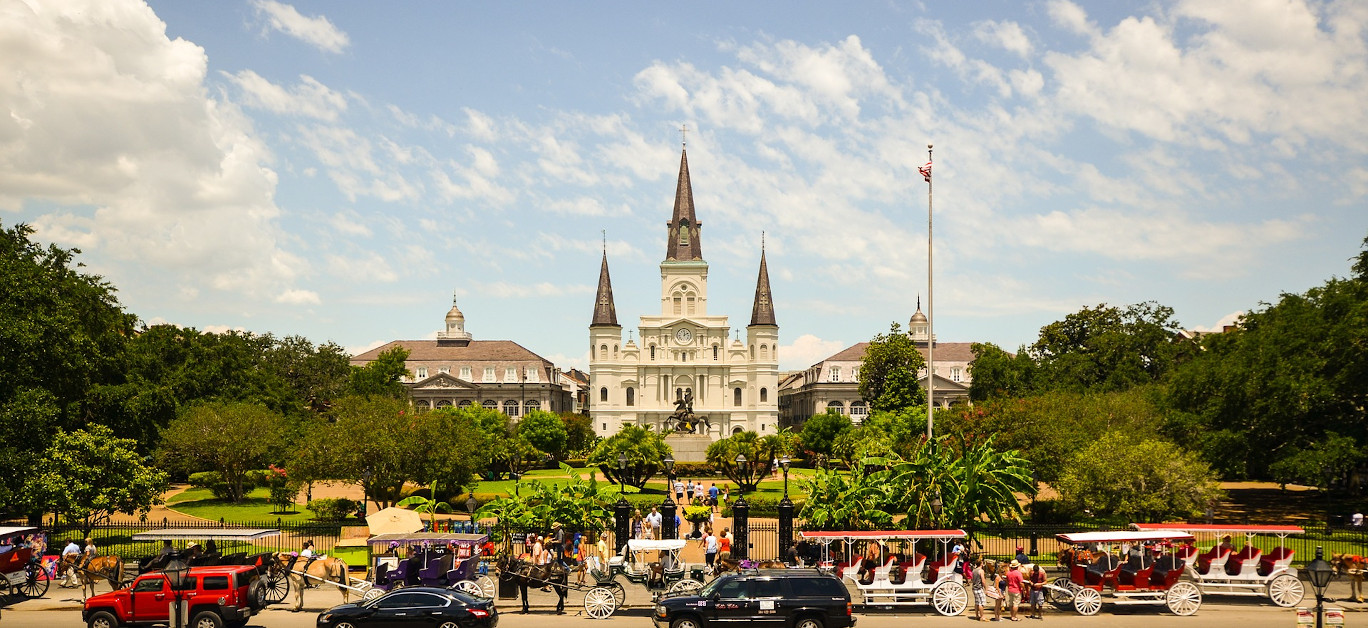As a billion dollar terminal opens at Louis Armstrong New Orleans International Airport, Sally Meeson discovers why the Deep South has never been more hip.
It’s a warm November evening and I’m getting dressed in a large hotel room with a cool warehouse loft feel. I walk barefoot along a dark hardwood floor, passing modern artwork hanging from exposed brickwork and a scattering of stylish furnishings. Settling myself in a large grey armchair by the window, I throw on my heels as I gaze at the twinkling lights and soaring tower blocks beyond.
I could easily be in New York or LA… but a sound from the street below reminds me that I’m actually somewhere far more magical. Brass instruments pump out a rousing tune as around 50 people, lit up with fairy lights, march through the darkness.
This is my first experience of a “second line parade”, but it is to be just one of many musical delights which will greet me around almost every corner in this soulful city. I’m in Louisiana, I’m in the “Big Easy”, I’m in the fabulous New Orleans.
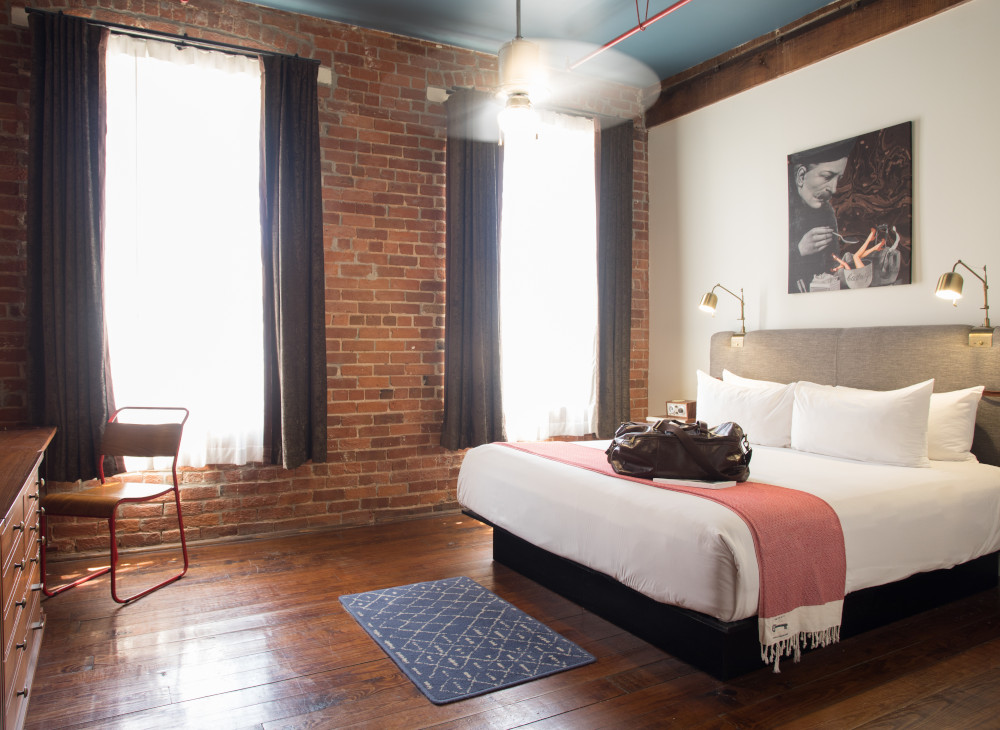
I’ve based myself in the hip Arts District for my visit and am staying at the Old No 77 Hotel & Chandlery. Set in 3 restored 19th-century warehouses this cool boutique hotel blends modern design with the rustic creativity this city is renowned for. Local artists’ works, which are available to buy, hang off almost every wall.
There’s even an old cigarette vending machine in the lobby where you take pot luck to purchase original miniature artworks. And the hotel is also home to one of the best restaurants in town, Compere Lapin, a Caribbean-Mediterranean eatery which is a major hit with both locals and food critics.
But tonight I’m all dressed up so am hitting the town, eating a few streets away at local favourite Seaworthy. As a pescatarian this place proves to be a little piece of southern heaven. Seaworthy specialises in wild-caught, sustainable seafood from American waters, but its major draw is its oysters.
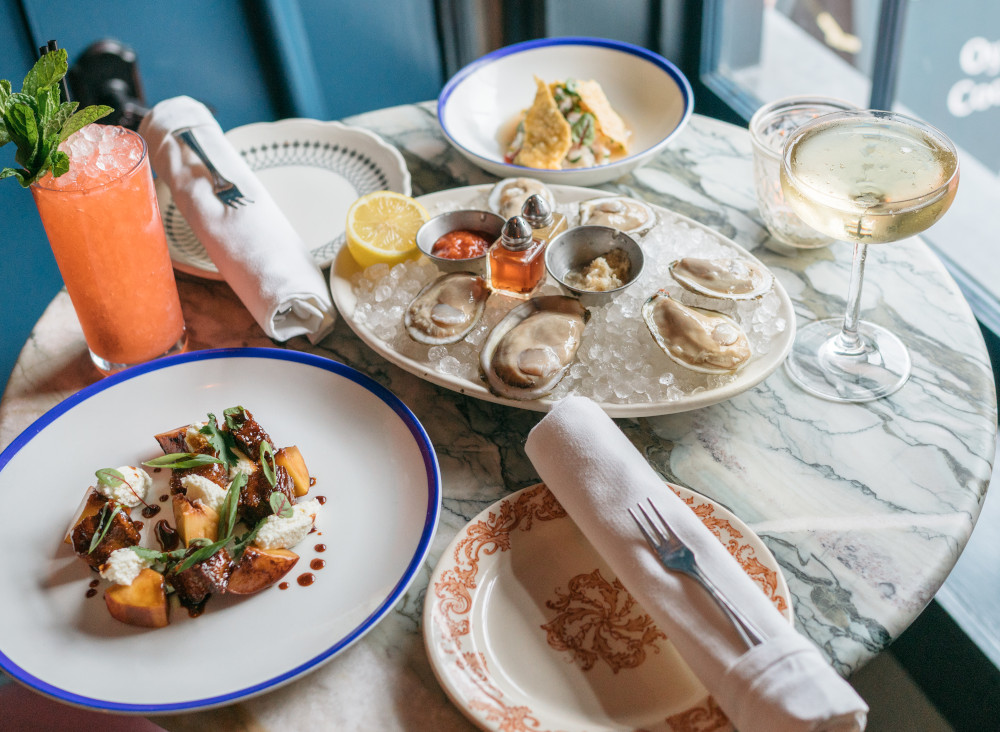
I perch on a tall bar stool in this dimly lit saloon as the barman takes me through some of their salty best, explaining the subtle differences in tastes from the Gulf Coast to the East and West Coast. And what else would I wash them back with than the New Orleans classic Sazerac, the cocktail which was created here in the 19th century and became synonymous with the party scene of the time.
With this in mind (and a number of Sazercas down) I’m now firmly in the mood to experience the thing the Big Easy is probably most famous for: live jazz! From Seaworthy I wander next door to the glamorous Ace Hotel. After walking through an entrance lined with large exotic plants, then through a French deco style lobby bar, I find myself in a darkened back room which doubles as an intimate live music venue.
People huddled at small candlelit tables sip cocktails and appear completely transfixed by a beautiful young woman with long dark hair singing on stage. She seems so intuitively in tune with her band members and so completely engrossed in the music they’re creating together it’s almost like the whole group has been possessed by some higher power.

As a newcomer to this particular jazz scene I’ve never experienced sounds so organic and seemingly effortless. I’m later told that the singer, Sasha Masakowski, is from one of New Orleans’ most celebrated musical families and that my introduction to jazz has been quite an exceptional one!
The next morning it’s a balmy 25 degrees, the skies are a cloudless blue and I can’t wait to explore this city by day. I have breakfast at my hotel, then cross the palm lined Canal Street with its rattling street cars, and head straight for the iconic French Quarter. I’d been prepared for the old world charm of this place but I wasn’t quite expecting so much glamour.
Almost all the hotels in this area are 5 star and countless high end boutiques sit amongst the artist studios and mystical pharmacies. I find myself beneath the intricate wrought iron balconies and lush green hanging plants of Royal Street.
With its grand antique shops and fine art galleries I could be on London’s Portobello Road, but a now familiar sound pulls me back to my actual location. I turn a corner and find around 15 people perched on a pavement rattling out a bluesy tune from an assortment of clarinets, banjos, a double bass and a large tuba. There is literally music everywhere in this place.
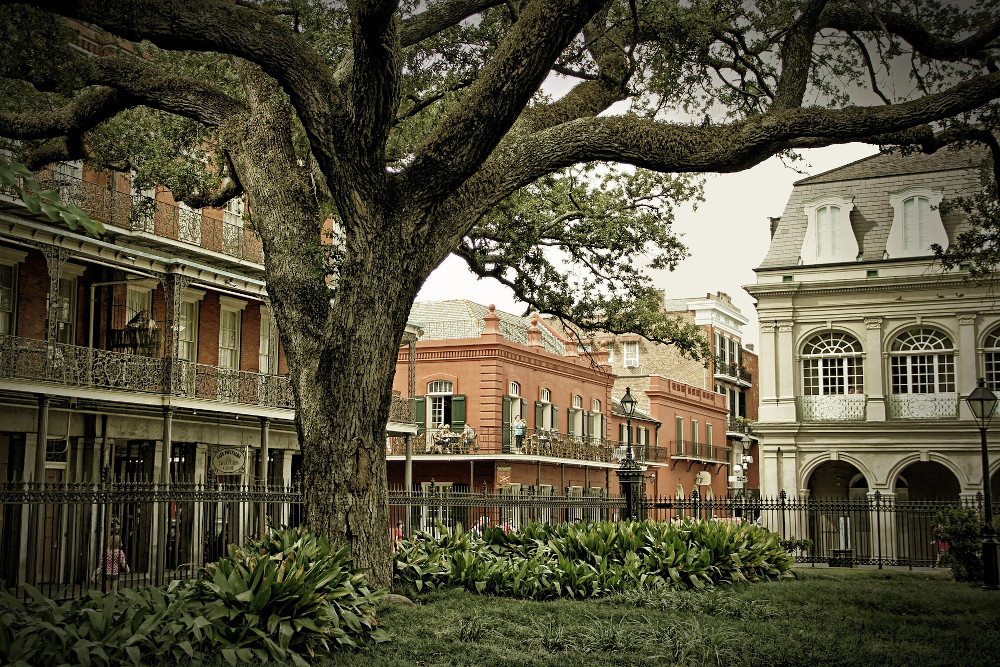
I cross a couple more streets, inching closer to the winding waters of the Mississippi, and reach the heart of the French Quarter: Jackson Square. This historic public park is flanked by majestic old buildings. Street artists work busily around it, pinning their colourful canvases to its railings, while tourists circle in horse and carriages.
But just off this bustling spot I find a tranquil place for lunch, in the quaint creole courtyard of a restaurant called Tableau. Inside, large black chandeliers hang in bright airy rooms created by talented local interior designer Jennifer Kelly. But today the tinkling of a stone fountain draws me to its paved outdoor space, where I sip mimosas and dine on sautéed gulf shrimp in the warm November sunshine.
The next day it’s time to hit the road and head in the direction of Mississippi. Before getting there I stop off for an evening in the rapidly up and coming Baton Rouge. Tonight, its main thoroughfare, Government Street, is decked out in endless strings of white lights. This long and busy road is lined with increasingly fancy choices of bars and restaurants.
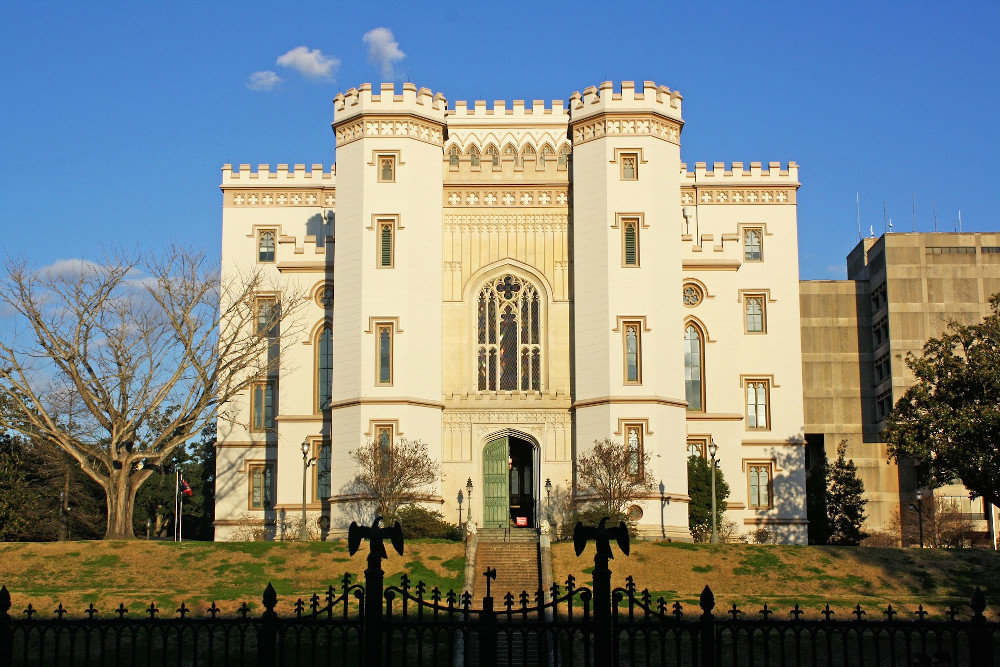
And once a month it hosts a market known as “White Light Night”, showcasing the best in local craft and artisan culture. It also connects me to the final leg of my journey: the legendary Route 61, also known as the Blues Highway, which takes me all the way to southern Mississippi.
After about an hour I come to a large road sign welcoming me to the home of American music, and then I follow the signs for Natchez. After the glitz of New Orleans I’ve come here for my fix of old school elegance.
Natchez is the oldest city on the Mississippi and had more millionaires per capita than any other US city before the Civil War. And since most of these millionaires’ grand plantation mansions are still standing, and now open their doors to visitors, I’m keen to step back in time with a look inside.
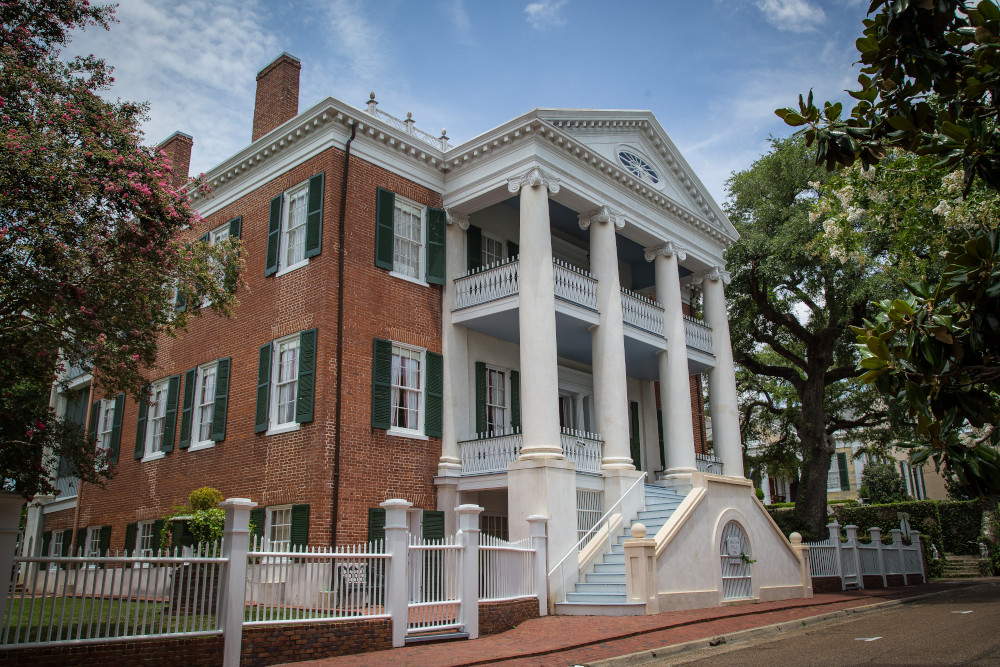
I arrive on a quiet, unassuming street, where one large house with a sweeping double porch held up with white columns dwarfs the rest. This is Choctaw Hall, an historic home dating back to around 1836. I climb the white stone steps at the entrance and ring the doorbell. A small, grey haired, bespectacled man opens the door and welcomes me into a huge entrance hall where a spiral staircase swirls around a tall and elaborately decorated Christmas tree.
This is David, the owner, who will give me my tour. First he guides me to an extravagant dining room with a long mahogany table drowning in giant silver plateaus, candelabras and what he tells me is the family’s original china, sourced from all over the world. Next it’s onto a spacious living room with gold velvet armchairs, glittering chandeliers and an elegant grand piano next to a harp.
Then it’s up the spiral staircase to the bedrooms, where the four poster beds are so high (to keep the occupants away from the cold floor he tells me) there are little wooden steps to climb into them. He chatters throughout my tour, sharing tales from the family and their decadent parties of old.
When he passes a stuffed peacock off as their old pet “Aristotle” who, he tells me, would wander these parties and help himself to birthday cake, I have to admit I do raise an eyebrow. But then I’m finding there’s an element of theatre to this part of the world which is simply more fun to just go along with.
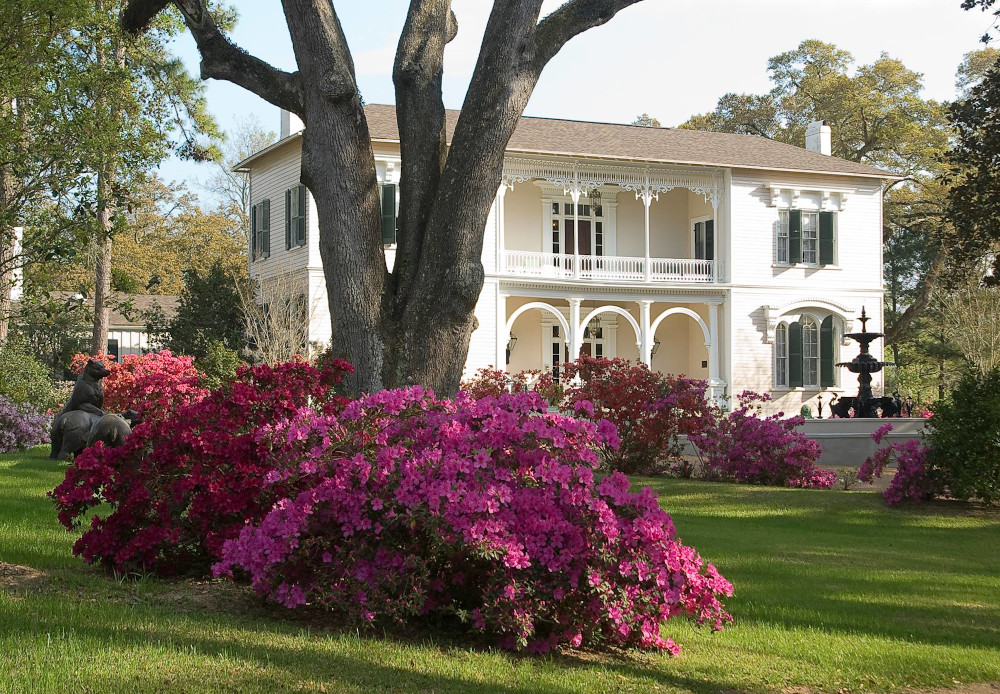
This observation prepares me well for the next house on my list: The Towers. I find this cream and white antebellum mansion down a tree lined drive, in a gravel courtyard with a large fountain at its centre. I ring the doorbell and the front door swings open to reveal Ginger, the house owner and my next flamboyant tour guide.
Born in LA in the late 1940s Ginger is blonde and fabulous, and my eyes are immediately drawn to a huge ruby hanging around her neck. I later find out that this was the necklace Bette Davis wore when she played Elizabeth in The Private Lives of Elizabeth and Essex, and that Ginger is an obsessive collector of costume jewellery.
And as I enter her home not only do I find it packed to the ceilings with Christmas trees and decorations, she’s also managed to display most of her jewellery collection on top of them.
“The Jeweled Christmas Tour at The Towers” is an annual extravaganza and a visual feast. Brooches take the place of baubles on Christmas trees, necklaces hang from furniture (and numerous sparkling reindeers) and there are rhinestones and Swarovski crystals almost everywhere you look.
Many pieces have a Hollywood connection… Ava Gardner’s brooch, Grace Kelly’s napkin holders, a copy of Jackie Onassis’ million dollar necklace… and Ginger’s stories which accompany them are almost as dazzling as the jewels. After seeing everything… from a watch chain from Gone With The Wind to a stripper’s front piece… I leave, dizzy on diamantes and celebrity stardust. And I wonder if the original owners of The Towers could ever have imagined anything quite like this!












